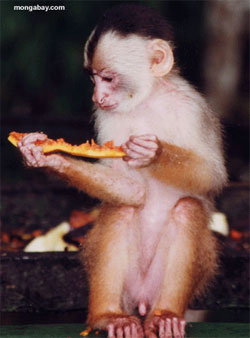Monkeys indicate economic decision-making may be innate
mongabay.com
May 3, 2006
New research out of Yale University argues that monkeys and humans exhibit similar economic biases, suggesting that economic decision-making have deeper roots than many economists suspect.
The study, published in the current Journal of Political Economy, examined how a colony of capuchin monkeys responds to economic decisions to see “whether systematic economic biases such as risk-aversion are learned behaviors — and thus easily ameliorated through market incentives — or biologically based, arising in novel situations and in spite of experience.”
The Yale researchers found that monkeys conducting business-like activities — including trading and gambling — behave in ways that closely mirror human behavioral inclinations.
“Traditionally, economists have remained agnostic as to the origins of human preferences,” writeM. Keith Chen, Venkat Lakshminarayanan, and Laurie R. Santos, authors of the study. “[But] if much of the fundamental structure of our preferences were so deep rooted as to extend to closely-related species, this would bolster the assumption of preference stability.”
 Capuchin monkey in Brazil. Photo by R. Butler |
|
According to a statement from Yale University, the study involved presenting the capuchin monkeys with “two payoff-identical gambles: one in which a good outcome was framed as a bonus, and the other in which bad outcomes were emphasized as losses. Like humans, the monkeys displayed a strong preference for the first option, and like humans, the monkeys seemed to weigh the losses more heavily than comparable gains.”
“Our results suggest that loss-averse behavior is a very general feature of economic choice,” explain the authors. “Given our capuchins’ inexperience with trade and gambles, these results suggest that loss-aversion extends beyond humans, and may be innate rather than learned.”
Capuchins, a group of monkeys found in Central and South America. are considered the most intelligent New World monkeys for their use of tools. They have even been observed crushing up and applying dead millipedes to their far as an insect repellant.
This article is uses quotes and excerpts from news release from Yale University.